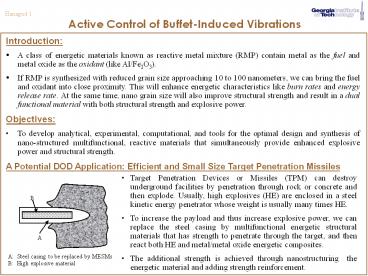R-067 Entry Point Screening
1 / 4
Title:
R-067 Entry Point Screening
Description:
The additional strength is achieved through ... Add additional strength reinforcement (RRMP) as found necessary at nano, ... Strength and energetic ... –
Number of Views:55
Avg rating:3.0/5.0
Title: R-067 Entry Point Screening
1
Hanagud 1
Active Control of Buffet-Induced Vibrations
- Introduction
- A class of energetic materials known as reactive
metal mixture (RMP) contain metal as the fuel and
metal oxide as the oxidant (like Al/Fe2O3). - If RMP is synthesized with reduced grain size
approaching 10 to 100 nanometers, we can bring
the fuel and oxidant into close proximity. This
will enhance energetic characteristics like burn
rates and energy release rate. At the same time,
nano grain size will also improve structural
strength and result in a dual functional material
with both structural strength and explosive
power. - Objectives
- To develop analytical, experimental,
computational, and tools for the optimal design
and synthesis of nano-structured multifunctional,
reactive materials that simultaneously provide
enhanced explosive power and structural strength.
A Potential DOD Application Efficient and Small
Size Target Penetration Missiles
- Target Penetration Devices or Missiles (TPM) can
destroy underground facilities by penetration
through rock or concrete and then explode.
Usually, high explosives (HE) are enclosed in a
steel kinetic energy penetrator whose weight is
usually many times HE. - To increase the payload and thus increase
explosive power, we can replace the steel casing
by multifunctional energetic structural materials
that has strength to penetrate through the
target, and then react both HE and metal/metal
oxide energetic composites. - The additional strength is achieved through
nanostructuring the energetic material and
adding strength reinforcement.
2
Approach to the Proposed Basic Research
Hanagud 2
- Develop a framework of oxidants and fuels to
synthesize multifunctional energetic structural
materials (MESM). Synthesize reactive metal/oxide
particle (RMP) mixtures by two different novel
sol-gel processes and a traditional mixing
process.
- Add additional strength reinforcement (RRMP) as
found necessary at nano, micro and macro levels.
Develop functionally graded materials for
transition
between RRMP and conventional structural
materials. Develop methods to produce desired
structural shapes of RMP and RRMP.
- Develop constitutive equations, reaction
characteristics, stress-induced reaction criteria
by using (a) ab initio procedures and molecular
dynamics, (b) thermodynamic constitutive equation
modeling procedure and (c) novel method of
bridging length and time scales. - Establish failure theories and explosive reaction
initiation criteria. - Tests to quantitatively characterize MESMs
parameters of constitutive equations, mechanical
failure criteria, reaction initiation criteria,
reaction kinetics/process and reaction products. - Design model target penetrating missiles (TPMs)
with varying amounts of energetic structural
materials or reinforced energetic structural
materials. - Evaluate the design, and perform mechanical test
on coupon samples (with and without fuel).
Computational evaluation of the performance of
designed TPM. - Impact and penetration tests of designed TPMs.
- Post-test analysis of TPM without the fuel
component (inert) microscopic analysis of
sections of post-test penetrators. - Prediction of the performance of MESMs for other
DOD applications.
3
Hanagud 3
- Research Team
- MURI Participants Georgia Tech S. Hanagud (PI),
D. McDowell, N. Thadhani, R. Tannenbaum, F.
Mistree, A. Sexana, M. Zhou, M. Li, and J. Allen
VPI R. Batra Univ of Florida L. Vu-Qouc
Florida State Univ A. Stiegman Univ of
Maryland W. Fourney and J. Cardenas-Garcia - Matching Fund Participants MURI participants
will work in cooperation with AFRL scientists W.
Wilson, M. Hughes, O. Toness, M. Dilmore,
R.Armstrong and Krammer and Lawrence Livermore
Laboratory scientists J. Satcher,A. Gash. - Interactions through a secure website video
conferences - Task Interactions
Critical experiments for Strength, Constitutive
Equations, Reaction Initiation, and Reaction
Process on RMP and RRMP
Ab Initio and Molecular Dynamics Modeling,
Constitutive Equations, Bridging Scales for
Multifunctional ESMs
Material Tests and Model Validation Tests
Synthesis of Multifunctional Energetic
Structural Materials
Reinforcement Concepts
Design of Model TPM Numerical Simulations of
Designed TPMs
Optimization for Multifunctionality Reactivity
in RMP RRMP
Fracture Characteristics and Improvement of
Fracture Toughness
Tests of TPMs without Fuels
Predictive Equations, Procedures for Munition
Designs, Procedure of ESMs
Tests of TPMs with Fuels
Analysis of Recovered Penetrators
4
Hanagud 4
Expected Results
- A framework for the selection/design of reactive
metal/metal oxide mixture (RMPs) that can
facilitate manufacturing different
multi-functional energetic structural materials - Synthesis procedures of selected RMP
- Methods of reinforcing RMP to produce
multifunctional energetic structural material
(MESM) for strength and energetic characteristics - Strength and energetic characteristics of MESM
- Establishment of the link between MESM and their
use in DOD applications, including missiles - Method of design of a model target penetrating
missile (TPM) using MESM to increase the energy
released from the current levels - Procedure for the analysis of the model TPM, test
article, testing and validation for
impact/penetration - Discussion of other potential DOD applications
- Training of graduate students, including doctoral
students - Training of minority students
- Building an infrastructure for future research.































